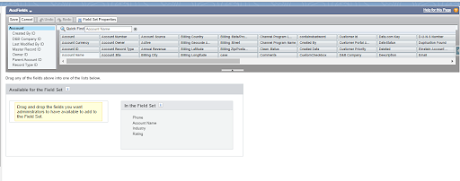Dynamic Standard Datatable Using Fieldset
Dynamic Stand Datatable using fieldset
Create a fieldSet
HTML
<template>
<div class="c-container">
<div class="slds-card">
<div class="slds-media__body">
<h2 class="slds-card__header-title">
<span>{lblobjectName} Records ({recordCount})</span>
</h2>
</div>
<div class="slds-card__body">
<lightning-datatable
key-field="Id"
data={tableData}
columns={columns}
min-column-width=200>
</lightning-datatable>
</div>
</div>
</div>
</template>
JS
import { LightningElement, api, track } from 'lwc';
import getFieldsAndRecords from '@salesforce/apex/utilityClass.getFieldsAndRecords';
export default class LwcFieldSetComponent extends LightningElement {
@api recordId; // record id from record detail page e.g. ''0012v00002WCUdxAAH'
@api SFDCobjectApiName='Account'; //kind of related list object API Name e.g. 'Case'
@api fieldSetName='AccFields'; // FieldSet which is defined on that above object
@api criteriaFieldAPIName; // This field will be used in WHERE condition e.g.'AccountId'
@api firstColumnAsRecordHyperLink; //if the first column can be displayed as hyperlink
@track columns; //columns for List of fields datatable
@track tableData; //data for list of fields datatable
recordCount; //this displays record count inside the ()
lblobjectName; //this displays the Object Name whose records are getting displayed
connectedCallback(){
let firstTimeEntry = false;
let firstFieldAPI;
//make an implicit call to fetch records from database
getFieldsAndRecords({ strObjectApiName: this.SFDCobjectApiName,
strfieldSetName: this.fieldSetName })
.then(data=>{
//get the entire map
let objStr = JSON.parse(data);
/* retrieve listOfFields from the map,
here order is reverse of the way it has been inserted in the map */
let listOfFields= JSON.parse(Object.values(objStr)[1]);
//retrieve listOfRecords from the map
let listOfRecords = JSON.parse(Object.values(objStr)[0]);
let items = []; //local array to prepare columns
/*if user wants to display first column has hyperlink and clicking on the link it will
naviagte to record detail page. Below code prepare the first column with type = url
*/
listOfFields.map(element=>{
//it will enter this if-block just once
if(this.firstColumnAsRecordHyperLink !=null && this.firstColumnAsRecordHyperLink=='Yes'
&& firstTimeEntry==false){
firstFieldAPI = element.fieldPath;
//perpare first column as hyperlink
items = [...items ,
{
label: element.label,
fieldName: 'URLField',
fixedWidth: 150,
type: 'url',
typeAttributes: {
label: {
fieldName: element.fieldPath
},
target: '_blank'
},
sortable: true
}
];
firstTimeEntry = true;
} else {
items = [...items ,{label: element.label,
fieldName: element.fieldPath}];
}
});
//finally assigns item array to columns
this.columns = items;
this.tableData = listOfRecords;
console.log('listOfRecords',listOfRecords);
/*if user wants to display first column has hyperlink and clicking on the link it will
naviagte to record detail page. Below code prepare the field value of first column
*/
if(this.firstColumnAsRecordHyperLink !=null && this.firstColumnAsRecordHyperLink=='Yes'){
let URLField;
//retrieve Id, create URL with Id and push it into the array
this.tableData = listOfRecords.map(item=>{
URLField = '/lightning/r/' + this.SFDCobjectApiName + '/' + item.Id + '/view';
return {...item,URLField};
});
//now create final array excluding firstFieldAPI
this.tableData = this.tableData.filter(item => item.fieldPath != firstFieldAPI);
}
//assign values to display Object Name and Record Count on the screen
this.lblobjectName = this.SFDCobjectApiName;
this.recordCount = this.tableData.length;
this.error = undefined;
})
.catch(error =>{
this.error = error;
console.log('error',error);
this.tableData = undefined;
this.lblobjectName = this.SFDCobjectApiName;
})
}
}
Apex Class
@AuraEnabled
public static String getFieldsAndRecords(String strObjectApiName, String strfieldSetName)
{
Map<String, String> returnMap = new Map<String,String>();
if(!String.isEmpty(strObjectApiName) && !String.isEmpty(strfieldSetName)){
//get fields from FieldSet
SObject sObj = (SObject)(Type.forName('Schema.'+ strObjectApiName).newInstance());
List<Schema.FieldSetMember> lstFSMember =
sObj.getSObjectType().getDescribe().fieldSets.getMap().get(strfieldSetName).getFields();
//prepare SOQL query based on fieldAPIs
String query = 'SELECT ';
for(Schema.FieldSetMember f : lstFSMember) {
query += f.getFieldPath() + ', ';
}
query += 'Id FROM ' + strObjectApiName +' limit 10' ;
List<SObject> lstRecords = Database.query(query);
system.debug(lstRecords);
//prepare a map which will hold fieldList and recordList and return it
returnMap.put('FIELD_LIST', JSON.serialize(lstFSMember));
returnMap.put('RECORD_LIST', JSON.serialize(lstRecords));
return JSON.serialize(returnMap);
}
return null;
}


Comments
Post a Comment